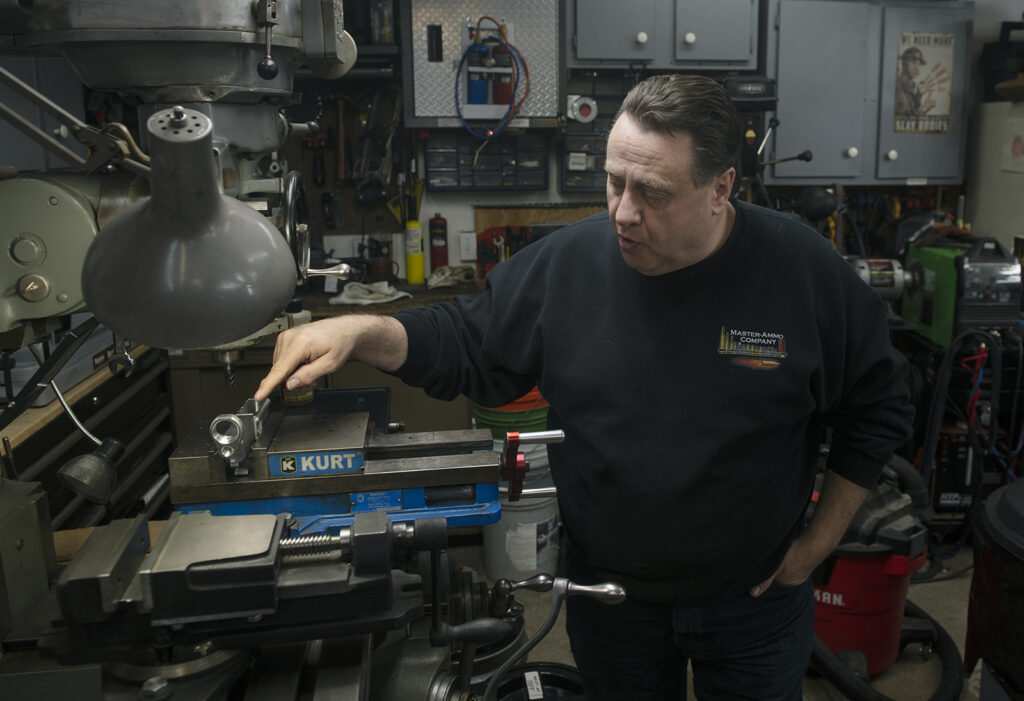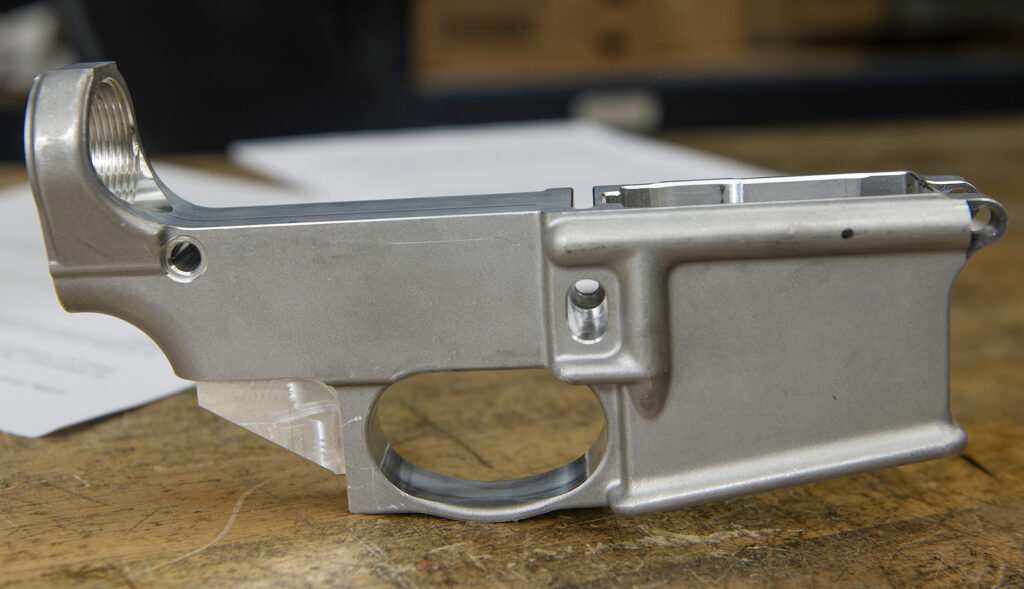On a quiet street in Rochester, Beaver County, the Master-Ammo Co. operates out of a cramped garage in an unassuming white house, its machine room strewn with power tools, boxes of bullets and shotgun shells.
Under fluorescent lights sits Sam Piccinini, a gunsmith who’s dealt in weapons and ammunition for nearly a decade. On a metal shelf behind him, a dull black AR-15-style rifle rests flat on its side.
Piccinini holds up a silver-colored 80% finished receiver, the part of a firearm that contains its trigger assembly. It is the foundation of a self-assembled weapon that’s sold in kits — dubbed more recently as “ghost guns” — because the kits are not given serial numbers and are sold without background checks, making them virtually untraceable for someone looking to build one.

To this Western Pennsylvania gun merchant, a new federal crackdown that blames ghost guns for a spike in U.S. shootings is rooted in bad information about the weapons and who buys them, despite supporters of stricter gun control lauding it as a step toward curbing violence.
To make a comparison, Piccinini holds up in his other hand a finished receiver, this one black. Lasered into its side are the words “Let’s Go Brandon,” a phrase used by some to denounce President Joe Biden. Unlike the 80% receiver, this one has noticeably defined and machined grooves that allow for a barrel and other parts to be installed to make it an operating firearm. And it contains a serial number.
On April 11, Biden’s U.S. Department of Justice announced that it had submitted to the Federal Register a final regulatory rule designed to curb the proliferation of ghost guns nationwide amid a sharp increase in shootings.
Under the rule, the unfinished ghost gun kit would be regulated the same as the finished product, in part an effort to keep untraceable weapons from being built for criminal activity.
Piccinini isn’t buying it.
“You can see clearly there’s a significant amount more machine work that is done on this one,” Piccinini said, pointing to the finished version. “You’ve got to have experience with machinery and hand tools to be able to pull this off and make it work.”
Piccinini has sold 80% receiver kits along with standard firearms at gun shows from Monroeville to Washington County. While their sale is still legal under federal and state law — except in Philadelphia, which cracked down further on ghost guns in 2021 — the Biden administration rule will change the way ghost gun receivers are sold.
Under the rule, unfinished 80% receivers like Piccinini’s will be regulated the same way regular firearms are: background checks would be required to purchase them, and they would have to contain serial numbers. Those selling the kits commercially will also need to possess a federal firearms license.
The rule goes into effect 120 days from its publication in the Federal Register, according to the DOJ. Already it’s inspired a fierce backlash from pro-gun advocates and an effort by Senate Republicans to repeal it.
In the afternoon of the DOJ’s announcement, the gun violence prevention group CeaseFirePA lauded the rule, calling it a major step in the fight against gun violence. According to statistics provided by CeaseFirePA, the seizure of self-assembled guns by law enforcement increased tenfold in Philadelphia from 2016 to 2020.
CeaseFirePA’s western regional manager, Josh Fleitman, said he believes the ghost gun crackdown will prevent the same trend from emerging in Pittsburgh, where police have not seen such numbers.
“Really, what it does is make clear is what we’ve all known for a long time, which is that ghost guns are real guns,” Fleitman said in a phone call with the Pittsburgh Post-Gazette. “They kill people, they destroy lives, just like any other regular firearm does, so it’s a long time coming that they are now treated like the deadly firearms that they are.”
That 80% receiver kits can be purchased without background checks is a “massive gap in the system,” according to Fleitman.

“You really couldn’t design a weapon that was more appealing to somebody that wanted to commit a crime than a ghost gun,” he said.
But Piccinini believes it’s not criminal activity driving the sale of 80% receiver kits, because the process of assembling them to be fully functional requires expertise with complex machinery, like the cutting tool anchored along the wall of the Master-Ammo garage that costs nearly $4,000.
“You’ve got to have somewhat of a hands-on skill to be able to run the machinery and work with your hands to be able to finish making this firearm,” Piccinini said.
“These guys aren’t taking the time to fire up machinery, slide in the receiver, and finish them off. I’ve done that, for my own personal benefit, probably a couple of them. (To say) anyone can do it and that it only takes minutes, there’s a lot more to that.”
Before he was a business owner, Piccinini was a police officer in Beaver County for 30 years. After working for the Rochester Police Department, Piccinini was recruited by the Beaver County District Attorney’s office in 1993 to work as a detective for the county’s anti-drug task force. In 2001, Piccinini joined the county’s Emergency Services Unit, which functions like a SWAT team, and led a team of elite snipers.
From his field experience, Piccinini believes criminals are much more likely to purchase a weapon on the black market, or steal one, than to buy a gun kit and assemble one themselves.
Recently released data on guns recovered from juveniles in Western Pennsylvania tells a story similar to what Piccinini described.
Presented by Pittsburgh police, U.S. Attorney Cindy Chung and the federal Bureau of Alcohol, Tobacco, Firearms and Explosives, the statistics were released at a press conference Friday in the wake of the shooting incident at an Airbnb party that left two 17-year-olds dead and several others injured early Easter Sunday.
Collected over the past two years, the data was sourced from 50 cases of juvenile gun seizures by law enforcement. In 48.9% of the seizures, the weapon recovered was reported stolen, while just 8.9% were a “privately made firearm,” a term used to classify ghost guns.
Later, in an email conversation, the Pittsburgh police public information officer, Cara Cruz, provided further statistics on ghost gun recoveries in the city.
In 2021, the first year the department began tracking ghost guns separately from total guns, Cruz said that 50 out of 920 recovered firearms were ghost guns — a little over 5% of seizures.
As of April 11, the department had recovered just 16 in 2022.
Still, Fleitman said, ghost guns were being recovered in record numbers in Philadelphia, a trend that should worry Pittsburgh officers.
According to Philadelphia police, 95 ghost guns were recovered there in 2019. By 2021, that number had increased to 571.
“The issue is most prominent in the eastern part of the state, and it’s been working its way slowly over to us here in Pittsburgh,” Fleitman said. “I’ve definitely heard growing concern and awareness from law enforcement in the Pittsburgh area about ghost guns.”
If criminal activity isn’t yet a primary driver in the demand for ghost guns, then Piccinini believes he knows who really is interested in owning an untraceable weapon.
He called them preppers, individuals concerned about disruptions to social, political and economic order in the United States.
“A lot of people don’t trust the government,” Piccinini said. “They want to be able to have a firearm, where if something happened, the government couldn’t come looking for it. Not that they’re criminals. Just that they want to circumvent the ability for there to be a paper trail.”
Over the course of an afternoon at Master-Ammo, Piccinini often sprung from his seat to grab different examples of gun kits and to demonstrate machinery, his frustration with the federal proposal physically animating him.
Overall, Piccinini is worried that smaller steps in federal regulation could lead to larger government oversight in the continuing battle between those advocating for the Second Amendment and legislators seeking to pass gun reform.
Piccinini slapped a slab of aluminum onto a table with a large thud — the building block of what eventually becomes an 80% receiver.
“If I’ve got a maple tree, I’ve got the ability to have and possess baseball bats,” Piccinini said. “So anybody that has a slab of aluminum and a milling machine, just because they have a chunk of aluminum cut into a 5-inch length — is that technically now an AR-15 receiver? Where do you draw the line?”
___
© 2022 PG Publishing Co Distributed by Tribune Content Agency, LLC



